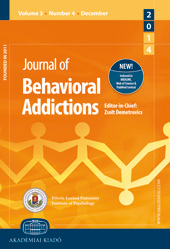The role of family and personality traits in Internet gaming disorder: A mediation model combining cognitive and attachment perspectives
The role of family and personality traits in Internet gaming disorder: A mediation model combining cognitive and attachment perspectives
Author(s): Melina A. Throuvala, Mari Janikian, Mark D. Griffiths, Mike Rennoldson, Daria J. KussSubject(s): Behaviorism
Published by: Akadémiai Kiadó
Keywords: gaming addiction; parental acceptance–rejection; PARTheory; core self-evaluations; Internet gaming disorder; attachment
Summary/Abstract: Background and aims. Gaming disorder was recently recognized as a mental health disorder by the World Health Organization and included in the International Classification of Diseases. Extensive research has been conducted with regard to psychosocial correlates and comorbidity, less so for the developmental mechanisms and the processes leading to the disorder. The association between family factors, personality traits, and gaming has been studied independently but not in combination. To fill this gap in knowledge, this study examined (a) the association between parental acceptance–rejection theory and Internet gaming disorder (IGD) and (b) the mediating and moderating effect of core self-evaluations (CSE), a personality construct, on the aforementioned variables. Methods. The study was quantitative and involved young adults members of online gaming communities (N = 225). Results. The results showed that parental rejection is associated with the occurrence of IGD, only through the mediating effect of CSE. The moderation model was not confirmed. Discussion. Findings bridge early emotional deficits with CSE personality traits and IGD, based on two widely acknowledged theoretical frameworks. In addition, they highlight the importance of the father’s role in upbringing. Conclusions. These frameworks combine cognitive and attachment perspectives and a process-oriented approach to the development and maintenance of IGD. The implications of these findings are discussed in relation to (a) the mechanisms leading to the disorder and (b) providing an evidence base for therapeutic interventions for IGD to go beyond abstinence and include self-esteem enhancement and efficacy contingencies. Directions for future research are also provided in this study.
Journal: Journal of Behavioral Addictions
- Issue Year: 8/2019
- Issue No: 1
- Page Range: 48-62
- Page Count: 15
- Language: English

